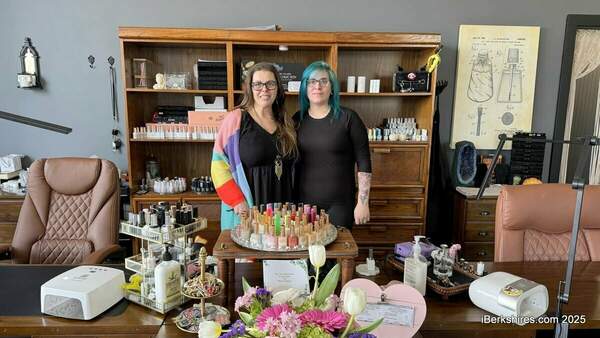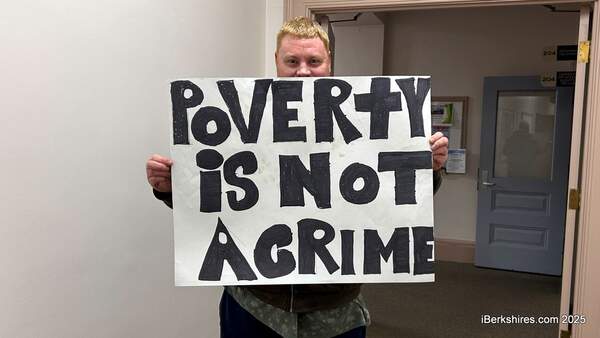
Pittsfield's Rock 'n' Roll High School Is Back
 WTBR's station was rebuilt and the estimated 10,000 records from the station's early years have been sorted and catalogued. |
Through the years, budgeting cut the station down and down and until it was a small radio club run by people who had very little radio experience. The equipment starting breaking, the line from the radio tower to the school started to soak up water making the signal scratchy, and students and staff just forgot there was a station on the campus.
In 2006, that changed.
Longtime radio host Larry Kratka has revived and rebuilt the station. It now thrives with 35 to 40 involved students and more than a dozen adult hosts providing more than 80 hours of programming a week.
"When I started there was nobody here. Now, I can't keep them out," Kratka said on Wednesday. "The students and some of the staff didn't even know it was here."
Four years ago, Kratka, a morning host for local Vox Communications stations WUPE, WNAW and WBEC, was asked by his friend Carl Flossic, who hosts a polka show at the station, to fix a microphone. When he went, it irked him that the station was in disarray and he agreed to take over as adviser despite being advised by his friends to avoid the aggravation.
"I just hate to see this place go down the toilet," Kratka said.
Right away, he got his company to donate used equipment and got his friends to help rebuild the studio, tucked behind a classroom. But it was a slow start. He sent out a notice to students and got a staff of six.
"It is amazing what has gone on here," Kratka said. "This station has everything WUPE has. It's the same system to what they have on Jason Street. These students can fit right in with commercial radio."
The station now fills more than 80 hours of programming a week. Hosts can do live remote broadcasting or even host shows from home. Students and adults did 26 consecutive hours of coverage of the local Relay for Life this past spring. And the most influential county residents have all been interviewed on-air. The station is now getting fan mail, too.
"We got a letter from a man at the Berkshire County House of Corrections saying he loved our show and listened to us all the time," Kratka said.
The station has drawn attention from both students and former students. Many of the hosts from the station's early years have returned, he said. Students will come in on days off, start early on half days or even put in full eight-hour shifts. Even some weekends and holidays.
One who noticed the new station was Billy Madewell, now the student programming director.
Madewell said he did not have any career ambitions nor did he know anything about radio last year. He was focused on playing football. But then he repeatedly sprained his ankle and had difficulty walking. After an MRI and an X-ray, he found out that his ankle problems were caused by a benign tumor and needed surgery.
He was going to miss a season of football and surgery could have caused long-term nerve damage, he said. A friend of his, Shane Reed, was working with the station at the time and encouraged him to join.
"There was nothing else I could do for the team other than support so I tried this," Madewell said. "This is my passion now."
 Billy Madewell found the radio station after he was injured and could not play football. His career ambitions are now in broadcasting. |
He's also helped with election coverage on WBEC and he might do a summer internship with the locally owned WBRK station. Next year, he plans on going to Massachusetts College of Liberal Arts in North Adams to pursue a degree in broadcasting.
"My goal for going to MCLA is to make that station better," Madewell said. "After I graduate, I will have experience in four different radio stations."
Unlike other schools and colleges, Taconic's station is run just like a commercial radio station, Kratka said, so students can seamlessly transfer to other stations.
The students are not just learning how to be hosts. For example, Kratka said, Reed is more interested in learning the engineering side of radio. Kratka has been teaching him how the equipment works and how to build a station.
A rock format was developed to guide the station so students could get used to having a criteria of the things they can play. WTBR coined itself the county's "only rock station." However, being a school station instead of commercial, that format is loose and allows the group to do very different and creative things, he said.
"This is not cookie-cutter radio. It's a whole different animal. We can be cutting edge," Kratka said. "But I want to teach these kids what it's like to be at a real radio station."
Local radio professionals hold workshops with the students and the station is trying to raise money to buy equipment suitable for sports coverage. The students would be able to learn how to do play-by-play sports reporting for football and basketball. Kratka has even launched a new website that streams the station's programs.
On Wednesday, some students were live on the air while others recorded shows to play over the Christmas vacation. Typically the students host shows after the final bell until as late as 8 p.m.; during the day, adults have shows but the schedule is often shifting, Kratka said.
"I come in here every day and I love it. It's like a family here," said student Emilee Kiernan, who is in her second year on the staff.
Madewell characterized the close-knit group as the "most dysfunctional family" because it spans all barriers from class to race to popularity. The group is very welcoming and freshman students can walk in and go on the air, Kratka said.
As for the adults, Kratka lets people from the community become involved. They have to pass a criminal background check to be in the school but adults seldom interact with the students, he said.
Among the more well-known adult programs is John Krol's "Good Morning, Pittsfield." The city councilor has been simulcasting the show weekday mornings from 7:30 to 8:30 for four years from the school.
The station operates on a $6,000 allotment from the school budget but immediately $1,000 goes to music licenses, Kratka said. Its broadcast license does not allow advertisements but as the station continues to grow, the group will soon have to expand its fund raising. Maintaining and replacing the equipment is very expensive, he said; for example, replacing the wiring from the transmission tower to the station cost $2,500.
The station has received some donations and the station provides underwriting support credits to those donors, he said. That underwriting support has not been for monetary donations yet but may be in the future.
More information and streaming content can be found at www.WTBR.com.















